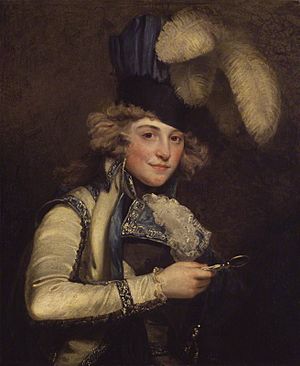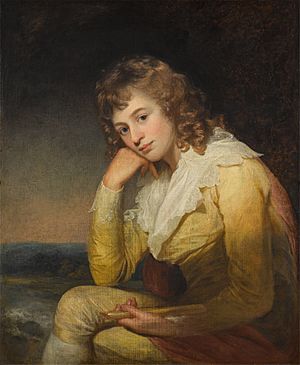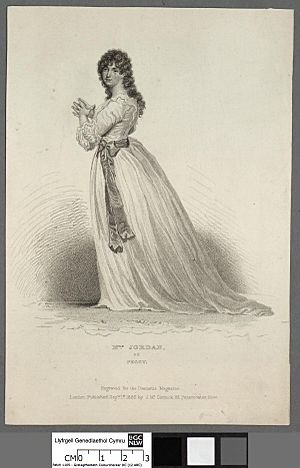Dorothea Jordan facts for kids
Quick facts for kids
Dorothea Jordan
|
|
|---|---|

Mrs. Jordan in the Character of Hippolyta, painting by John Hoppner, first exhibited 1791 (previously in the National Gallery and Tate collections, now on loan to the National Portrait Gallery)
|
|
| Born |
Dorothea Bland
22 November 1761 |
| Died | 5 July 1816 (aged 54) |
| Other names | Dorothea Phillips, Dora Jordan, Madame James, Mrs FitzClarence |
| Occupation | Actress |
| Partner(s) |
|
| Children |
|
Dorothea Jordan (born Dorothea Bland; 22 November 1761 – 5 July 1816) was a famous Anglo-Irish actress. She was well-known for her stage performances. She was also the long-time partner of Prince William, Duke of Clarence, who later became William IV, the King of the United Kingdom. They had 10 children together, all of whom used the last name FitzClarence. She was known by several names during her career, including Dorothea Francis, Dora Jordan, and Mrs. Jordan.
Contents
Early Life of Dorothea Jordan
Dorothea Bland was born near Waterford City in Ireland on 22 November 1761. She was the third of six children. Her parents were Francis Bland and Grace Phillips.
Her siblings were:
- George Bland (c.1758 – 1807)
- Hester Bland (baptised 1760 – buried 1848)
- Lucy Bland (1763/64 – 1778)
- Francis Bland (fl.1813)
- Nathaniel Phillips Bland (1766/67 – buried 1830)
Her father, who worked backstage in a theatre, left the family when Dorothea was about 13 years old. He continued to send them small amounts of money. However, this money came with a condition: the children could not use his last name. Because of this, Dorothea started using her mother's maiden name, Phillips.
Theatrical Career of Dorothea Jordan

Dorothea Jordan's first stage appearance is not completely clear. Some records say she first acted in 1777 in Dublin. Others suggest her first show was on 3 November 1779. In Ireland, she played various roles, including Priscilla Tomboy and Anne in Richard III. At the Smock Alley Theatre, she even played male characters in "reversed" casts. Her last show in Dublin was on 16 May 1782.
After this, she moved to England, specifically Leeds. She was hired by Tate Wilkinson, who managed the York Company. It was during this move that she started using the last name 'Jordan'. She also adopted the title "Mrs." like other actresses in the company. Her first performance in England was on 11 July 1782. She played Calista in The Fair Penitent. Wilkinson paid her 15 shillings a week, and she quickly became a favorite with audiences.
A scholar named Cornelious Swan was amazed by her talent. He said she learned quickly and performed as well as famous actresses. Jordan acted with Wilkinson's company from 1782 to 1785. She was very good at learning her lines, which sometimes made other actresses jealous. During this time, she had her first daughter, Frances.
Later, the famous actress Sarah Siddons saw Dora Jordan perform. Siddons thought Jordan was not ready for London theatres. However, William Smith from London soon offered Jordan a job at Drury Lane with a salary of £4 per week. She accepted the offer. Her last show with Wilkinson's company was on 9 September 1785. She then moved to London with her mother, her two-year-old daughter, and her sister.
In 1785, she made her first London appearance at Drury Lane. She played Peggy in The Country Girl. The Morning Post newspaper praised her performance. They said she had natural talent and a lovely voice.
People soon realized her greatest talent was in comedy. She was praised for being "natural" on stage. Audiences also loved her in "breeches roles," where she dressed as a man. These roles included Viola in Twelfth Night and Sir Harry Wildair.
Even though she was known as a great comic actress, Jordan was also a good Shakespearean and serious actress. She played roles like Ophelia and Emilia in Othello. When she first auditioned, she was asked if she preferred "tragedy, comedy or opera?" She simply answered "All."
While she played many types of roles, some people felt she was less convincing in playing noble women. Besides acting in London, Jordan also performed in other cities like York, Edinburgh, and Liverpool.
Her time at Drury Lane lasted until 1809. She then moved to Covent Garden in 1811. She made her last London stage appearance there in 1814. The following year, she retired from acting completely in Margate.
During her acting career, she wrote the popular song "The Bluebells of Scotland" around 1800.
In 1815, a theatre critic named William Hazlitt wrote about her. He said her talents were very natural. He felt she charmed everyone by just being herself. He called her "the child of nature" and said her voice was comforting because it came from her heart.
Life with William IV
In 1790, Dorothea Jordan became the partner of Prince William, Duke of Clarence. He was the third son of King George III. They had 10 children together. All of their children used the last name FitzClarence.
Their children were:
- George FitzClarence (1794–1842)
- Henry Edward FitzClarence (1795–1817)
- Sophia FitzClarence (1796–1837)
- Mary FitzClarence (1798–1864)
- Lord Frederick FitzClarence (1799–1854)
- Elizabeth FitzClarence (1801–1856)
- Lord Adolphus FitzClarence (1802–1856)
- Augusta FitzClarence (1803–1865)
- Lord Augustus FitzClarence (1805–1854)
- Amelia FitzClarence (1807–1858)
During this time, Jordan received money each year from Prince William. She continued to act until their separation in 1811. After their separation, Prince William gave her a larger yearly amount of money. This money included funds for their daughters' care. A condition was that she could not return to the stage if she wanted to keep the money and care for the girls.
Later Life and Death
In 1814, Dorothea Jordan's son-in-law, Thomas Alsop, got into serious debt. To help him, Jordan returned to acting. Because she went back to the stage, Prince William took legal action. He took their remaining daughters from her care and stopped her yearly payments. Jordan wrote letters to theatres and newspapers, asking for work.
In 1815, Jordan sold her home and moved to Boulogne, France. She used different names like Mrs. James. She later moved to Versailles and then to Saint-Cloud, near Paris. While in France, her eldest daughter, Frances, and son-in-law, Thomas Alsop, caused her more trouble. They ran up large debts in her name.
During this time, her health got worse. She felt very ill and weak. She wrote in a letter that she missed her children deeply. She died alone on 5 July 1816, from a ruptured blood vessel in her chest. She was buried in the cemetery in Saint-Cloud.
Images for kids
-
Mrs. Jordan in the Character of Hippolyta, painting by John Hoppner
See also
 In Spanish: Dorotea Jordan para niños
In Spanish: Dorotea Jordan para niños
 | Selma Burke |
 | Pauline Powell Burns |
 | Frederick J. Brown |
 | Robert Blackburn |



